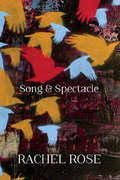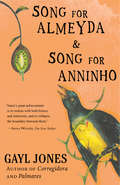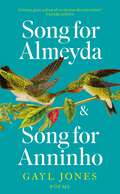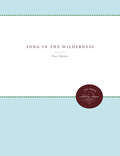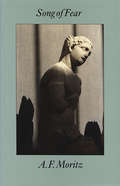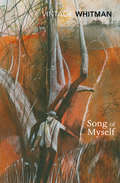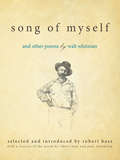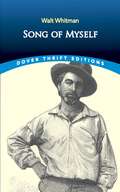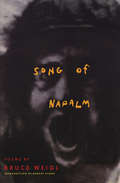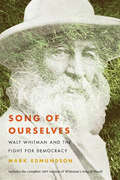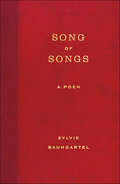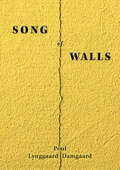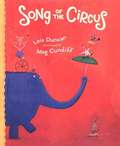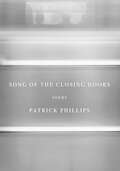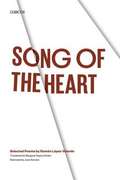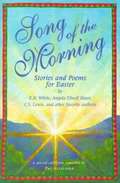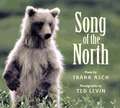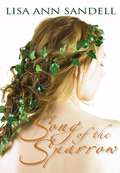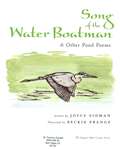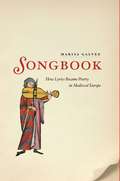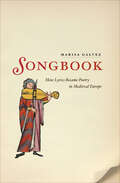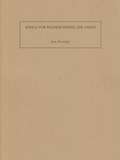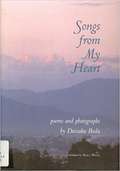- Table View
- List View
Song and Spectacle
by Rachel RoseSong and Spectacle, the third collection by award-winning poet Rachel Rose, is composed of fierce hymns to the particular and universal struggles of birth, passion and loss, and the paradoxical quest for non-attachment in a treacherous, unpredictable and yet deeply beloved world.Rose delves into the world of myth, using the stories of Daphne and Peneus, Shamhat and Enkidu and Grendel's mother to create new allegories for our times. Her poems also explore the aftereffects of suicide on those left behind, the truths of lesbian motherhood and the exquisite splendour of the natural world. Thus, even as she celebrates the cherry trees that ". . . create a spectacle, tossing their wet confetti/ at the window. A child's hair falls out/ on her pillow. Blood pools under the skin of the sky," she holds always the synchronous reality of beauty and pain, death and birth, love and loss, at the heart of her poetry. This hard-won knowledge makes her world and her words unforgettable.
Song for Almeyda and Song for Anninho
by Gayl JonesFrom the highly acclaimed author of Corregidora and The Healing—two epic poems, the love songs of fugitive slaves, set in 17th-century Brazil; continuing the unforgettable journey told in Gayl Jones’s masterwork, Palmares (2021). <p><p> Gayl Jones, the novelist Toni Morrison discovered decades ago and Tayari Jones recently called her favorite writer, offers two books in one with this volume of poetry. Jones renders the saga of Palmares, a foundational tale in the annals of colonial terrorism and Black resistance, in verse, told in the voices of the characters in her epic novel Palmares. <p><p> In the late 17th century, the fugitive slave enclave of Palmares was destroyed by Portuguese colonists. Amid the flight and re-enslavement of Palmares’s inhabitants emerges the love story of Almeyda and Anninho. In Song for Anninho, Almeyda moves between a dark present, in which she is once again enslaved and abused by a terrible captor, and memories of her lover, Anninho, whom she believes to have been killed. Song for Almeyda, released now for the first time, is told in the voices of Anninho and his fellow warriors.
Song for Almeyda and Song for Anninho
by Gayl JonesBy the acclaimed writer of Palmares and Corregidora.When the Portuguese attack Palmares, Brazil's last fugitive slave enclave, Almeyda and her husband are separated as they flee from the destruction. Amid the flight and re-enslavement of the inhabitants, their narrative emerges.Two powerful, epic poems give voice to the lovers: Almeyda's passionate lament for Anninho, whom she believes has been killed, is combined with his response as he searches for her. Their story is one of longing - for each other, for freedom - and for revolution.'I want to stay here, Anninho.''There won't be any wayyou can stay here.When they catch us,they'll take you back.''The men they kill,the women they take back.'
Song in the Wilderness
by Paul GreenThis work is a cantata for chorus and orchestra, with baritone solo, celebrating the pioneers who settled the American wilderness. In his poem, Green has given us the finer spirit of the ancestors of many native Americans throughout the republic. Charles Vardell has brought his imagination and distinguished skill to the translation of emotions, ideas, and aspirations into music.Originally published in 1947.A UNC Press Enduring Edition -- UNC Press Enduring Editions use the latest in digital technology to make available again books from our distinguished backlist that were previously out of print. These editions are published unaltered from the original, and are presented in affordable paperback formats, bringing readers both historical and cultural value.
Song of Fear
by A. F. MoritzA. F. Moritz's poems integrate nature and enduring myth with our inner life so movingly, so convincingly, that they almost seem to be our own thoughts. His direct and intimate tone, and the power, calm, and clarity of his expression, are solid foundations for an exhilarating breadth and range of imagination.
Song of Myself
by Walt WhitmanDo I contradict myself?Very well then I contradict myself.(I am large, I contain multitudes.)Abundant, ecstatic, generous, courageous - this is the first American epic poem, a celebration of selfhood and a catalogue of nineteenth-century American life of all ages and races. Revolutionary in style and controversial in content when it was first published in 1855, Whitman's masterwork has since inspired generations with its intoxicating rhythms and images, and its inclusive, praiseful joy.THE ORIGINAL 1855 TEXT
Song of Myself: And Other Poems by Walt Whitman
by Paul EbenkampWalt Whitman was deeply interested in the American language as it was emerging in his time. He was fascinated by the vocabularies of the sciences and the streets, and was a regular visitor to the New York Public Library, where he loved to peer into the provenience of the words he overheard and read. In this beautiful book, Robert Hass and Paul Ebencamp walk us through Whitman's "Song of Myself"—one of the greatest poems in American literature. Much is revealed about the words Whitman chose in 1855—their inflections, meanings, and native usages we wouldn't otherwise know. In doing so, we understand perhaps for the first time, Whitman's query in Song of Myself: "Have you felt so proud to get at the meaning of poems?" In the first part of the collection, Hass an introduction to the poem and, with Paul Ebenkamp, a rich annotation of "Song of Myself"—both the first version from the 1855 edition of Leaves of Grass, and the final, revised text that appeared in the so–called "Deathbed" edition of 1892. The second part of this book includes a selection of poems from across the span of Whitman's career that gives us a fresh look at Whitman's work.
Song of Myself: With A Complete Commentary (Iowa Whitman Ser.)
by Walt WhitmanIt was with this first version of "Song of Myself," from the 1855 edition of Leaves of Grass, that Whitman first made himself known to the world. Readers familiar with the later, revised editions will find this first version new, surprising, and often superior to the revisions, and exhilarating in the freshness of its vision. A selection of the Common Core State Standards Initiative.
Song of Napalm: Poems
by Robert Stone Bruce WeiglSong of Napalm is more than a collection of beautifully wrought, heart-wrenching and often very funny poems. It’s a narrative, the story of an American’s innocent’s descent into hell and his excruciating return to life on the surface. Weigl may have written the best novel so far about the Vietnam War, and along the way a dozen truly memorable poems.” Russell Banks
Song of Ourselves: Walt Whitman and the Fight for Democracy
by Mark EdmundsonIn the midst of a crisis of democracy, we have much to learn from Walt Whitman’s journey toward egalitarian selfhood. Walt Whitman knew a great deal about democracy that we don’t. Most of that knowledge is concentrated in one stunning poem, Song of Myself. Esteemed cultural and literary thinker Mark Edmundson offers a bold reading of the 1855 poem, included here in its entirety. He finds in the poem the genesis and development of a democratic spirit, for the individual and the nation. Whitman broke from past literature that he saw as “feudal”: obsessed with the noble and great. He wanted instead to celebrate the common and everyday. Song of Myself does this, setting the terms for democratic identity and culture in America. The work captures the drama of becoming an egalitarian individual, as the poet ascends to knowledge and happiness by confronting and overcoming the major obstacles to democratic selfhood. In the course of his journey, the poet addresses God and Jesus, body and soul, the love of kings, the fear of the poor, and the fear of death. The poet’s consciousness enlarges; he can see more, comprehend more, and he has more to teach. In Edmundson’s account, Whitman’s great poem does not end with its last line. Seven years after the poem was published, Whitman went to work in hospitals, where he attended to the Civil War’s wounded, sick, and dying. He thus became in life the democratic individual he had prophesied in art. Even now, that prophecy gives us words, thoughts, and feelings to feed the democratic spirit of self and nation.
Song of Songs: A Poem
by Sylvie BaumgartelA debut poetry collection from a writer whose vivid verse explores the connections and relationships that make us humanSometimes I like to feel sexy. Sometimes I don’t. Sometimes I like to be very plain. Invisible almost, hiding in plain sight. I want to hide and to be found. In the spirit of the biblical Song of Solomon, Sylvie Baumgartel’s Song of Songs takes the subjects of love and worship, and brings them to the desperate, wild spaces of domestic life. With a voice at once precise and oneiric, Baumgartel explores the landscapes of sex and desire, power and submission, in this groundbreaking book-length poem that forces us to question the bounds of devotion. An ambitious and vivid debut, Song of Songs is a work of breathtaking honesty, couched in language few of us are brave enough to speak aloud.
Song of Walls
by Poul Lynggaard DamgaardThe poetry collection Song of Walls by Poul Lynggaard Damgaard is a transformation of the poem when it meets the world, and when it meets the world again. The depth of the landscape in touch with the reeds. ‘The courage of the junction” is a poem published in The Long‑Islander, New York, 2018. The beauty of nature is a point of reference. Digtsamlingen Song of Walls af Poul Lynggaard Damgaard er en forvandling af digtet, når det møder verden, og når det igen møder verden. Landskabets dybde i berøring med sivene. ‘The courage of the junction’ er et digt udgivet i The Long Islander, New York, 2018. Naturens skønhed er et referencepunkt.
Song of the Circus
by Lois DuncanGisselda and Bop, true children of the circus stand up to the snarling tiger on the terrible day that the whole performance goes wrong.
Song of the Closing Doors: Poems
by Patrick PhillipsFrom New York City subway encounters to memories of pickup basketball games on Fourth Street, a love letter to the past, and to all the relationships and memories our homeplaces hold, from the National Book Award finalist.&“I will consider a slice of pizza," opens Phillips's poem "Jubilate Civitas." "For rare among pleasures in Gotham, it is both / exquisite and blessedly cheap." Thus, as throughout this collection, he celebrates a simple pleasure that "in a time of deceit . . . is honest and upright, steadfast and good"; even the busted buttons we press when waiting to cross the street make for elegy in a collection that brings us this poet at his burnished best. Phillips finds his love of a complex, vibrant city extends to his dearest people—he writes for his friend Paul, dying of cancer; for his wife&’s stormy eyes when they fight; for the baby boy he once woke at night to feed and change. All these and more pass through Phillips's elegant yet colloquial lines, in a book that shines with love and honesty on every page. As he writes, "If you're reading this / we were once friends."
Song of the Heart: Selected Poems by Ramon Lopez Velarde
by Ramon Lopez VelardeIn this illustrated volume of poetry, two of Mexico's most prominent artists, poet and painter, join their words and images of animals to create a work of startling insight and beauty.
Song of the Morning: Easter Stories and Poems for Children
by Pat AlexanderHere is a book for the whole family to enjoy this Easter, the year round, and for years to come. The Easter events form the climax to a story that began long before. So this book starts with the creation and spoiling of the world, God's rescue plan and the coming of Jesus. The Bible's stories of Palm Sunday, Good Friday and Easter Day are placed in context.
Song of the North
by Frank Asch Ted LevinBear, Puffin, Moose, and all the other inhabitants of the North know its songs. It sings of clean icy waters for fishing, craggy cliffs for nesting, and smooth ponds for teaching babies to swim. The North embraces a community of creatures living together and sharing its resources.
Song of the Sparrow
by Lisa Ann SandellSince she was a small child, Elaine has been the only woman living in a military camp with hundreds of men. When her mother died, her father took Elaine and her brothers to Arthur's camp, where she regularly mingles with people who are now legends.
Song of the Water Boatman And Other Pond Poems: A Caldecott Honor Award Winner
by Joyce SidmanA collection of poems that provide a look at some of the animals, insects, and plants that are found in ponds, with accompanying information about each.
Songbook: How Lyrics Became Poetry in Medieval Europe
by Marisa GalvezToday we usually think of a book of poems as composed by a poet, rather than assembled or adapted by a network of poets and readers. But the earliest European vernacular poetries challenge these assumptions. Medieval songbooks remind us how lyric poetry was once communally produced and received—a collaboration of artists, performers, live audiences, and readers stretching across languages and societies. The only comparative study of its kind, Songbook treats what poetry was before the emergence of the modern category “poetry”: that is, how vernacular songbooks of the thirteenth to fifteenth centuries shaped our modern understanding of poetry by establishing expectations of what is a poem, what is a poet, and what is lyric poetry itself. Marisa Galvez analyzes the seminal songbooks representing the vernacular traditions of Occitan, Middle High German, and Castilian, and tracks the process by which the songbook emerged from the original performance contexts of oral publication, into a medium for preservation, and, finally, into an established literary object. Galvez reveals that songbooks—in ways that resonate with our modern practice of curated archives and playlists—contain lyric, music, images, and other nonlyric texts selected and ordered to reflect the local values and preferences of their readers. At a time when medievalists are reassessing the historical foundations of their field and especially the national literary canons established in the nineteenth century, a new examination of the songbook’s role in several vernacular traditions is more relevant than ever.
Songbook: How Lyrics Became Poetry in Medieval Europe
by Marisa GalvezHow medieval songbooks were composed in collaboration with the community—and across languages and societies: &“Eloquent…clearly argued.&”—Times Literary Supplement Today we usually think of a book of poems as composed by a poet, rather than assembled or adapted by a network of poets and readers. But the earliest European vernacular poetries challenge these assumptions. Medieval songbooks remind us how lyric poetry was once communally produced and received—a collaboration of artists, performers, live audiences, and readers stretching across languages and societies. The only comparative study of its kind, Songbook treats what poetry was before the emergence of the modern category poetry: that is, how vernacular songbooks of the thirteenth to fifteenth centuries shaped our modern understanding of poetry by establishing expectations of what is a poem, what is a poet, and what is lyric poetry itself. Marisa Galvez analyzes the seminal songbooks representing the vernacular traditions of Occitan, Middle High German, and Castilian, and tracks the process by which the songbook emerged from the original performance contexts of oral publication, into a medium for preservation, and, finally, into an established literary object. Galvez reveals that songbooks—in ways that resonate with our modern practice of curated archives and playlists—contain lyric, music, images, and other nonlyric texts selected and ordered to reflect the local values and preferences of their readers. At a time when medievalists are reassessing the historical foundations of their field and especially the national literary canons established in the nineteenth century, a new examination of the songbook&’s role in several vernacular traditions is more relevant than ever.
Songs
by Derek HendersonThe poems in Derek Henderson's Songs are "translations" of a film cycle of the same name, shot by American filmmaker Stan Brakhage (1933-2003) to document his and his family's life in Colorado in the mid-1960s. Where Brakhage's films provide a subjective visual record of his experience bewildered by the eye, these poems let language bewilder the space a reader enters through the ear. Henderson tenders the visual experience of Brakhage's films-films of the domestic and the wild, the private and political, the local and global-into language that insists on the ultimate incapacity of language-or of image-to fully document the comfort and the violence of intimacy. Songs expresses the ecstasy we so often experience in the company of family, but it just as urgently attests to ecstasy's turbulent threat to family's stability. Like Brakhage's films, Henderson's poems carry across into language and find family in every moment, even the broken ones, all of them abounding in hope.
Songs (Mountain West Poetry Series)
by Derek HendersonMountain West Poetry Series Published by the Center for Literary Publishing at Colorado State University The poems in Derek Henderson’s Songs are “translations” of a film cycle of the same name, shot by American filmmaker Stan Brakhage (1933–2003) to document his and his family’s life in Colorado in the mid-1960s. Where Brakhage’s films provide a subjective visual record of his experience bewildered by the eye, these poems let language bewilder the space a reader enters through the ear. Henderson tenders the visual experience of Brakhage’s films—films of the domestic and the wild, the private and political, the local and global—into language that insists on the ultimate incapacity of language—or of image—to fully document the comfort and the violence of intimacy. Songs expresses the ecstasy we so often experience in the company of family, but it just as urgently attests to ecstasy’s turbulent threat to family’s stability. Like Brakhage’s films, Henderson’s poems carry across into language and find family in every moment, even the broken ones, all of them abounding in hope.
Songs For Relinquishing the Earth
by Jan ZwickySongs for Relinquishing the Earth contains many poems of praise and grief for the imperilled earth drawing frequently on Jan Zwicky’s experience as a musician and philosopher and on the landscapes of the prairies and rural Ontario.
Songs From My Heart: Poems and Photographs
by Daisaku IkedaDaisaku Ikeda, a poet laureate, has produced vast amount of poems. In these poems, readers will find genuine feelings and impressions of the real life of a man “who strives at all times to be an honest human being”. Songs from My Heart is the compilation of Ikeda’s poems in which he expresses reflections and ideas that sprang from his daily whirlwind of activities, in such a straight-forward manner that it can be described as his personal diary. Poems here honor youth, nature and the common people.
